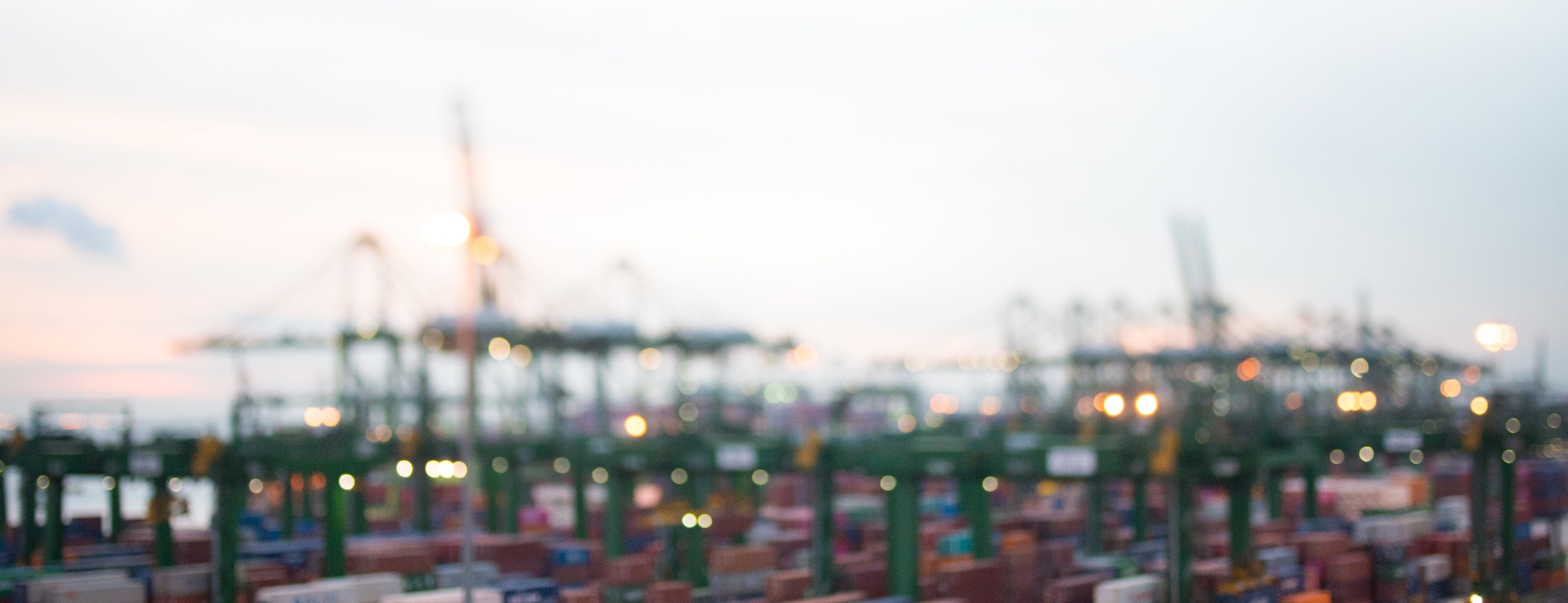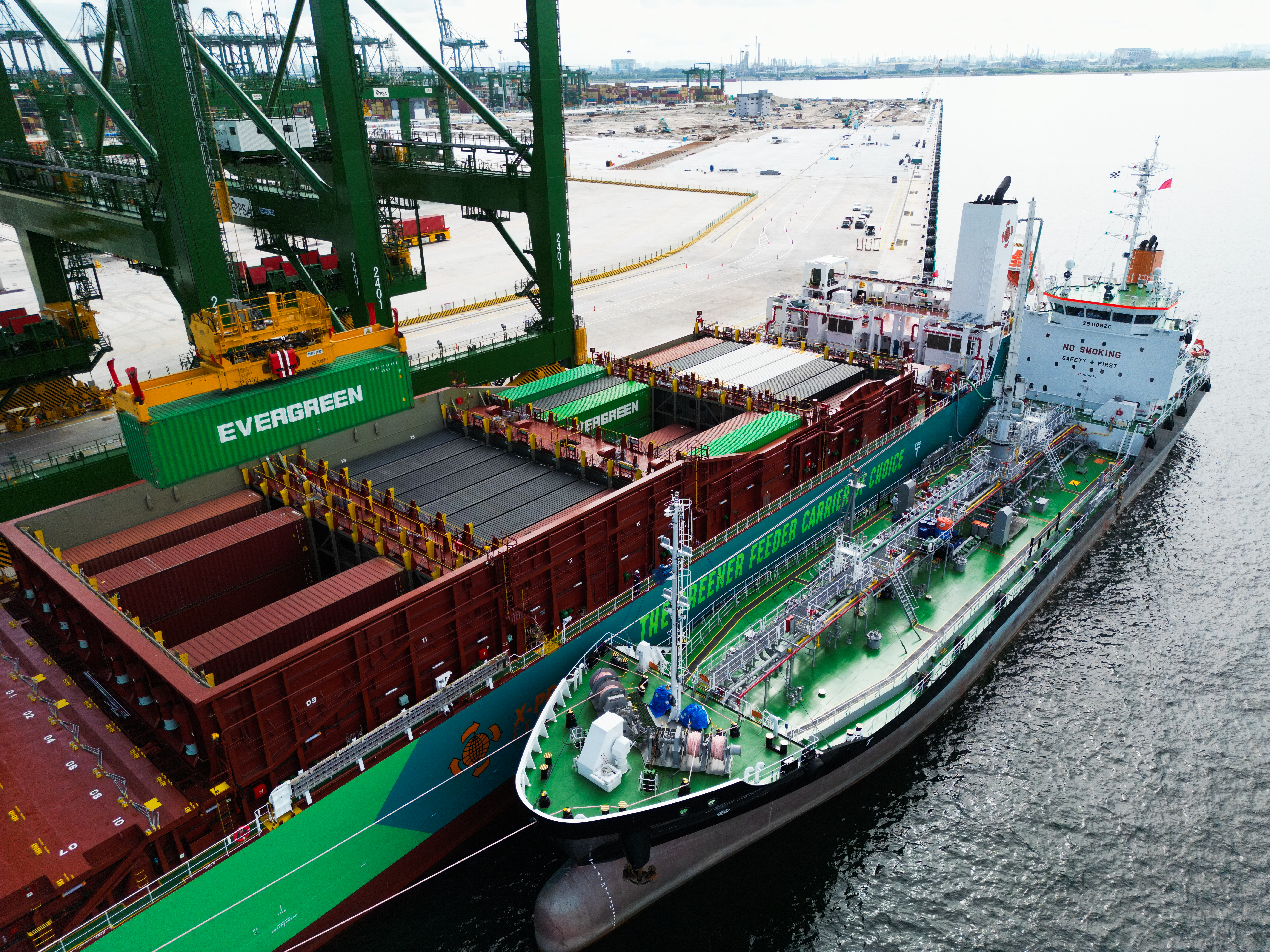

Singapore is Ready for Methanol Bunkering for Container Vessels at Tuas Port with First Successful Simultaneous Methanol Bunkering and Cargo Operation
X-Press Feeders, Global Energy Trading Pte Ltd (GET), and PSA Singapore (PSA) have successfully completed the first simultaneous methanol bunkering and cargo operation (SIMOPS) in Singapore on 27 May 2024. The SIMOPS was conducted at the new Tuas Port with the support of the Maritime and Port Authority of Singapore (MPA), together with various government agencies and local research institutions. The use of the mass flow metering (MFM) system for methanol, together with the use of digital bunkering, was also trialled during the SIMOPS. This follows the inaugural ship-to-containership methanol bunkering for the Laura Maersk in July 2023, and the successful ship-to-ship methanol bunkering of close to 1,340 metric tonnes of blended methanol for the Stena Prosperous on 24 May 2024.
A X-Press Feeder container vessel on her maiden voyage from Asia to Europe was successfully refuelled with approximately 300 metric tonnes (MT) of bio-methanol by GET, a MPA-licensed bunker supplier, using MT KARA[1], a dedicated IMO type II chemical bunker tanker classified by Bureau Veritas and operated by Stellar Shipmanagement Services. The methanol fuel was supplied simultaneously while completing container moves[2], which is the preferred mode of operation for container vessels to enhance operational efficiency. The cargo operation was carried out with the use of PSA’s double trolley quay cranes and automated guided vehicles at Tuas Port. The SIMOPS was completed within one hour. With these operations, the Port of Singapore is ready for commercial scale operations for shore-to-ship, ship-to-ship, and simultaneous operations for methanol, and the same methodology is being followed for other new maritime fuels such as ammonia and hydrogen.
The ISCC-certified bio-methanol used for the SIMOPS was produced by OCI Global, a world-leading green methanol producer, and supplied via GET, a ISCC-certified[3] supplier. The fuel was lifted at Vopak Penjuru Terminal, Singapore, which is a ISCC-certified storage facility for biofuels and methanol.
Safety-First Approach
Additional preparations are required compared to ship-to-ship bunkering given the safety modelling and port-side coordination. A Hazard Identification (HAZID) and Hazard and Operability Study (HAZOP) workshop was organised by MPA in the lead up to the SIMOPS. Adapting the experience from previous operations, participants from various government agencies, industry, and local research institutions[4], discussed potential risks and developed the corresponding prevention, control, and mitigation methods to address them. The bunkering plan was also discussed, and the various roles and responsibilities were clarified to ensure a coordinated cross-agency response in an event of an incident. To ensure all participants were familiar with the required procedures and safety measures, a tabletop exercise was also carried out with the relevant stakeholders after the workshop.
To ensure the safe conduct of the SIMOPS, MPA had worked closely with the bunkering stakeholders to ensure that crew members are competent and trained in handling methanol as a marine fuel and associated emergency responses. As part of the preparations for the methanol bunkering operations on 24 May and 27 May, the crew from Kara had also attended the MPA-approved training course for the handling of methanol as a fuel that was conducted by the Singapore Maritime Academy (SMA), which is part of the plan to upskill and enhance competencies for the safe and efficient operation of new zero or near-zero emission-powered vessels under the Marine Energy Training Facility (METF) that was announced at Singapore Maritime Week 2024. For new fuels such as methanol, ammonia and hydrogen, all crew are expected to undergo new training; feedback from these initial batches will inform the course development by tripartite partners and our research community.
The Emergency Operations Centre set up at MPA’s Port Operations Control Centre monitored the operations, supported by a drone equipped with volatile organic compound detector and infrared camera to detect methanol leaks into the atmosphere and methanol flames in the event of an incident. MPA also worked with the Meteorological Service of Singapore to provide advance warning on lightning risk. Representatives from X-Press Feeders, GET, PSA, local research institutions, and other government agencies were also at the EOC as part of the emergency response team.
The methanol plume model[5], which was employed during the first methanol bunkering operation conducted in Singapore in July 2023, was enhanced to support the operation planning and incident response plan. The updated model incorporated specific SIMOPs parameters, including vessels’ structure, port configuration and infrastructure, and proximity of simultaneous activities being conducted during the SIMOPS. At steady state, the digital models will be used to support commercial scale operations in the Port of Singapore.
Getting Ready for The Port of Singapore to Supply Methanol at Scale
Following the completion of the world’s first ship-to-containership methanol bunkering in Singapore last year, MPA launched an expression of interest (EOI) for the supply of methanol as a marine fuel in Singapore. A total of 50 submissions from over 60 regional and international companies comprising energy companies, fuel suppliers, traders, bunker operators, and storage companies were received. The strong industry interest signals clear business confidence in Singapore as a key offtake location for methanol and provides strong indications that the industry is preparing for methanol bunker demand to scale up in the coming years. MPA will call for applications for a license to supply methanol blends as a marine fuel in Singapore before the end of the year.
MPA is currently developing the Technical Reference[6] for methanol bunkering, which will include the framework to govern the use of MFM and digital bunkering for methanol. MPA will also study further enhancements for the IMO Type II chemical bunker tanker as part of its ongoing work to develop the methanol bunkering licensing framework and Port Limit Bunker Tanker requirements for methanol bunkering. Insights from the EOI submissions will also inform the development of the methanol bunkering regulatory framework to ensure the safe and efficient supply of methanol blends as a marine fuel in Singapore at a commercial scale.
MPA has implemented digital bunkering since 1 November 2023, making Singapore the first port in the world to commence end-to-end digital bunkering operations. As part of on-going enhancements to allow MPA-approved digital bunkering solutions to be compatible for use with the bunkering of new fuels, the digital bunkering trial conducted as part of the SIMOPs has demonstrated the ability to transmit the essential methanol bunkering information electronically to various stakeholders and MPA, enabling near real-time visibility of the bunker delivery process. The potential to fully digitalise the bunker delivery process, including the bunkering of new fuels, will lead to significant time and cost savings for the entire maritime community, and will be part of the licensing requirements.
Ensuring a Future-Ready Maritime Workforce to Operate Zero- or Near-Zero Emission-Powered Vessels
MPA, together with 22 partners, including leading global marine engine manufacturers, will establish the METF which will collectively train over 10,000 seafarers and shore-based staff by the 2030s. The METF will be based on a decentralised network of training facilities based in Singapore. It will tap on partners’ assets and technologies to train the workforce on the safe handling, emergency response, and incident management involving future marine fuels such as methanol, ammonia and hydrogen.
Mr Teo Eng Dih, Chief Executive, MPA, said, “The successful execution of the SIMOPS is the outcome of many months of preparation for tripartite stakeholders to plan, prepare, and train to ensure the safety of the crew, port and vessel, while maintaining a high level of efficiency. The learnings gained from these operations will help to further refine the various SOPs and safety measures. We thank all our SIMOPS partners in helping to achieve this and we look forward to working with other like-minded partners, including on the use of digital bunkering and mass flow meter solutions, to operationalise the delivery of the new marine fuels in Singapore.”
Mr Francis Goh, Chief Operating Officer at X-Press Feeders said: “Today marks a historic milestone for both Singapore and the global maritime industry. Our vessel was not just the first to berth alongside here in Singapore and refuelled with green methanol, which reduces carbon emissions by 65% as compared to conventional marine fuel, but we were also the first in Singapore to achieve this while simultaneously loading and discharging cargo. These achievements demonstrate Singapore’s position at the forefront of the global maritime industry’s transition to renewable fuels. By working together collaboratively, we can achieve even greater progress.”
Ms Munee Chow, Group Business Manager of Global Energy Group said, “We would like to thank all partners for their tireless efforts contributing to the success in this ground-breaking SIMOPS methanol bunker delivery. Global Energy will continue bringing quality bunker service to support our partners’ changing needs on their path to decarbonisation.”
Mr Nelson Quek, Regional CEO Southeast Asia, PSA International, said, “The successful completion of simultaneous cargo operations and methanol bunkering at PSA Tuas Port stands as a testament to our shared commitment to curb carbon emissions and adopt cleaner alternative fuels. PSA strives to strengthen our competitiveness as a leading transhipment hub facilitating global trade by working with like-minded partners to promote green and sustainable development that can help accelerate decarbonisation across the entire maritime value chain.”
Kelvin Kang, General Manager, Stellar Shipmanagement, said “We are grateful for the support from MPA and other stakeholders on this methanol bunkering project, particularly in the areas of HAZID and HAZOP, safety requirements, and operational procedures. With the successful delivery of this project, we have enhanced our expertise in methanol bunkering operations. We are now confident in our ability to provide top-tier methanol bunkering supply services, aiding our partners in their decarbonisation efforts.”
Mr. Bashir Lebada, Chief Executive Officer, OCI Methanol & HyFuels, said “As the global leader in green methanol, we’re excited to be fuelling X-press Feeders new methanol dual-fueled feeder ships with OCI Hyfuels green methanol. Our partnership starts today in Singapore and will grow over the coming year to include the supply of X-Press Feeders’ vessels in Rotterdam for the servicing of European ports. This marks another significant step towards maritime decarbonization, led by early-movers like X-Press Feeders who are pioneering the use of dual-fuel vessels and we’re proud to play our part in supporting the rollout of these future proof vessels. We look forward to being the global partner of choice as the methanol-fuelled fleet continues to grow rapidly and maritime decarbonization regulations come into effect.”
Mr Rob Boudestijn, Vopak Singapore’s President, say, “We congratulate our esteemed partners on this significant milestone. As a reliable infrastructure provider for maritime bunkering over the past 40 years in Singapore, Vopak is gearing up to make all our terminals methanol-ready. This strategic initiative underscores our commitment to facilitating Singapore’s maritime decarbonisation journey in the multi-fuelled future and we stand ready to scale up and support the methanol bunkering supply chain across all four of our terminals”.
[1] Kara is the same bunker tanker that was used for the delivery of 1,340 metric tonnes of blended methanol to Stena Prosperous on 24 May 2024.
[2] Container moves include the restowing and loading of containers.
[3] The International Sustainability and Carbon Certification (ISCC) is a certification scheme that ensures compliance with international standards for sustainable feedstock, including biomass feedstocks and conversion processes, such as the production of bio-methanol.
[4] Agencies including Ministry of Manpower, National Environment Agency, Singapore Civil Defence Force, Singapore Food Agency, Public Utilities Board, and stakeholders and institutes including Nanyang Technological University’s Maritime Energy and Sustainable Development Centre of Excellence (MESD), DNV, Global Energy Group, OCI Global, PSA, and X-Press Feeders.
[5] Jointly developed by the Agency for Science, Technology and Research’s Institute of High Performance Computing (A*STAR’s IHPC), Nanyang Technological University’s Maritime Energy and Sustainable Development Centre of Excellence (MESD), the Technology Centre for Offshore and Marine, Singapore (TCOMS), and the National University of Singapore’s Tropical Marine Science Institute (TMSI).
[6] A Technical Reference (TR) for methanol bunkering is currently being developed in consultation with MPA and the Standards Development Organisation at Singapore Chemical Industry Council (SDO@SCIC).

